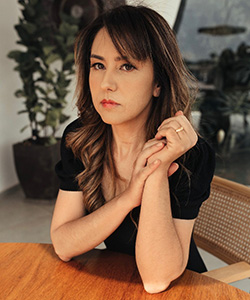
Dr. Fernanda Matos (She/Her)
Researcher, Professor, ConsultantCountry: Brasil
Languages: Portuguese, English, Spanish
Sectors: Academia, Freelance, Government, NGO
Primary Water Expertise: Integrated Water Resource Management (IWRM), Policy and Governance, Sustainable Development Goals (SDG's), Water Sanitation Hygiene (WASH), Gender
"I hold a Post-Doctoral and PhD in Administration from the Federal University of Minas Gerais. In 2022, I won the Green Rings award for The Climate Reality Project, founded by former US Vice President Al Gore"
"My lived experience with different groups to develop activities related to water and gender governance."
Water Experience
I currently work as a Professor, Researcher and Technical Consultant. In the academic field, my scientific production has focused on research on governance, water and gender, having generated scientific articles that have been published both in Brazil and abroad. Since December 2017, I have also worked as sub-coordinator of the Governance and Water Resources Project, at the UFMG’s Center for Graduate Studies and Research in Administration, with funding from Capes. In addition to administrative bureaucratic activities, I am also responsible for the development of the publications “Portraits of Water Governance in Brazil”, which seeks to present research analyses on the training process and profile of member representatives of collegiate water resources management bodies, including the special series with the theme of water and gender. The collection is composed of 32 E-books presenting information on State CBHs (17 e-books with data analysis by state); Federal CBHs (nine e-books with data per committee); Special Series (dedicated to the theme of water and gender). Available for access on some sharing platforms, including ResearchGate (https://www.researchgate.net/profile/Fernanda-Matos)
Related to the topic of water and gender, I have been working on five fronts, which are complementary in objective:
1) Presentation of disaggregated data on participation in collegiate bodies of the National Water Resources Management System. The other activities under development are aligned with this strategy of expanding the scientific debate on the topic and involving women in water management.
2) Co-organization of the books “Water and Gender: National and International Perspectives and Experiences” (volumes 1 and 2)
Book 1: https://www.researchgate.net/publication/359468865_Agua_e_Genero_-_Perspectivas_e_Experiencias_volume_1_ORG
Book 2: https://www.researchgate.net/publication/362025438_Agua_e_Genero_perspectivas_e_experiencias_-_Volume_2_ORG
2.1) Co-production of three chapters for the collection.
2.2) Co-organization of the book Water and Gender: Latin Perspectives, together with Prof. Alexandre Carrieri and Eldis Camargo (under review)
3) Co-organization of the Latin American Seminar on Water and Gender (SLAAG) The proposal is to promote monthly meetings, with different guests debating the topic. In the month of November we will hold the 16th edition.
3.1) Participation in Lectures, Webinars, Round Tables that also deal with the themes of water governance and gender.
4) Since 2019, I have been a contributing editor for the Rede Brasil de Organismos de Bacia, in the REBOB Mulher section. A space to disseminate experiences, reports, actions to engage women in the area of the environment, and especially in water management. My task is to invite, induce writing, review and suggest improvements in the texts received, among others (https://www.rebob.org.br/rebob-mulher-artigos)
4.1) Co-organization of the books Mulheres pela Água (volumes 1 and 2), gathering reports from 100 women who work in area of water resources.
Book 1: https://www.researchgate.net/publication/356285839_Mulheres_pela_Agua
Book 2: https://www.researchgate.net/publication/363108865_Mulheres_pela_Agua_volume_2_Org
Sustainable management of water resources and gender equality are interdependent. Recognition of the importance of gender balance is essential for us to evolve as a society. Even though this topic is under debate and much is said about the participation of women in the management of water resources, it is necessary that this materializes in an increasingly evident way. In general, these initiatives collaborate to say: "they [women in water management] exist"! This is because, often, when events are held in the area, the debate tables are predominantly male.. because they say that they did not identify women who work in the area... So, we tried to demystify this idea. After all, they exist.
5) Collaboration as a volunteer in international initiatives that seek to contextualize the gender issue in SDG 6.
5.1) UN-WATER: Integrated Monitoring Initiative for SDG 6. 12/2021 - current Gender Specialist (guest) for the SDG 6 gender contextualization work (https://www.unwater.org/news/gender-contextualisation-sdg-6-global-indicators)
5.2) UNEP /GWP / UNEP-DHI Center and UNDP Cap-Net. Request for follow-up interview on gender and SDG 6.5.1 (gender-specific question 2.2d). Collaboration of experts for the production of the report Advancing towards gender-sensitive water resources management.
Opportunities of Interest
- Speaking engagements (e.g., conference panels, keynote addresses)
- Leadership roles (e.g., board member, committees)
- Public outreach (e.g., media interviews, podcasts)
- Volunteer opportunities (e.g., community based projects)
- Consulting (e.g., government, industry, not-for-profit sector)
- Research (e.g., academic, not-for-profit, government)
Languages: Portuguese, English, Spanish
Sectors: Academia, Freelance, Government, NGO
Primary Water Expertise: Integrated Water Resource Management (IWRM), Policy and Governance, Sustainable Development Goals (SDG's), Water Sanitation Hygiene (WASH), Gender
